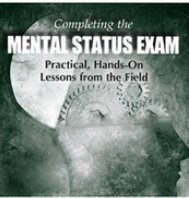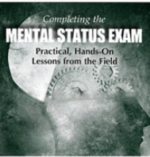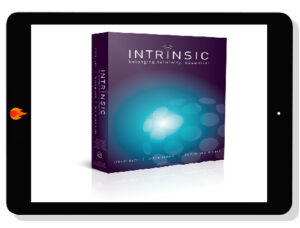You’ll discover ways of quickly assessing clients at risk for suicide, homicide, and medical compromise. Additional discussion will focus on the role of various information sources for accurate assessment of patients in each age group
Tim Webb – Completing the Mental Status Exam
APA GUIDELINES ON NECESSARY ELEMENTS
Differences in mood and affect
When to ask open-ended vs. closed-ended questions
When to become more directive, structured and observational
Speech abnormalities and differential diagnosis
Role of sleep and mood
Role of appetite and mood
COMPONENTS OF A MORE COMPREHENSIVE MENTAL HEALTH SCREENING
Sources of information
Client medication list
Family members and friends
Alcohol and drug screens
Other providers
Medical records
Documentation
Special populations
ASSESS AND UNDERSTAND PSYCHOTIC SYMPTOMS
Importance of distinguishing auditory hallucination type
Relationship of visual hallucinations and medical conditions
Hallucinations and substance abuse
Importance of type of delusions on differential diagnosis
Recognizing the over-medicated patient
Determining legal competency to make decisions
Case studies and scenarios
KNOWING WHICH TOOLS TO EMPLOY
Using and scoring common evaluative tools
St. Louis University Mental Status Examination (SLUMS)
Folstein Test/Mini-Mental Status Exam (MMSE)
Clinical Institute Withdrawal Assessment (CIWA)
Suicide/Self-Harm Scale
APA GUIDELINES ON NECESSARY ELEMENTS
Differences in mood and affect
Would you like to receive Tim Webb – Completing the Mental Status Exam ?
Description:
Perform and Document the MSE Correctly to Improve Treatment and Liability Protection
Completing the mental status exam is the most important task assumed by any behavioral health clinician. Accurate evaluation can be difficult because psychiatric symptoms often mask life-threatening substance withdrawal and/or serious medical conditions including brain tumors, delirium, head injury, diabetes, thyroid disease, etc. However, many graduate programs do not teach clinicians enough about recognizing and differentiating such symptoms. An accurate and efficient MSE is essential to discerning the patient’s true condition, developing an effective treatment plan, and, in extreme cases, saving his or her life.
This practical recording will help you improve your ability to perform the MSE by teaching you critical information generally not covered in graduate school as well as the American Psychiatric Association (APA) guidelines on the necessary elements for a full examination. Instruction on proper evaluation and keys to differential diagnosis will be a central theme of the recording. Included will be information on the assessment of various psychotic symptoms and how to understand their etiology, the use of drug and alcohol screens, clients’ medication lists, and more.
You’ll discover ways of quickly assessing clients at risk for suicide, homicide, and medical compromise. Additional discussion will focus on the role of various information sources for accurate assessment of patients in each age group, including lab values, family members, and medical records. Ultimately, this essential recording will teach you to perform and document the MSE correctly and efficiently to improve both clinical care and liability protection.








